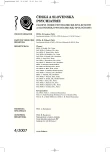-
Medical journals
- Career
The Quality of Life after Resective Surgery for Medical Refractory Epilepsy
Authors: J. Preiss; Z. Vojtěch
Authors‘ workplace: Nemocnice Na Homolce, Praha ředitel MUDr. V. Dbalý
Published in: Čes. a slov. Psychiat., 103, 2007, No. 4, pp. 175-183.
Category: Original Article
Overview
Goal:
The presentation assesses the subjective quality of life of 50 adults with intractable epilepsy before and after neurosurgical resective surgery.Methods:
Psychometrically validated Czech translations of queostionnaires WPSI (Washington Psychosocial Seizure Inventory), QOLIE-89 (Quality of Life in Epilepsy Inventory-89), ESI-55 (Epilepsy Surgery Inventory - 55), and the original Czech methods DSF (Questionnaire of satisfaction and frustration), SUPOS (Subjective feelings and states), and SUPOS-z (Subjective feelings and states - change) were used for the evaluation..Results:
After surgery, significant improvement in quality of life in many areas occurred, most strikingly in patients in whom seizures disappeared completely. In the whole sample,there were no statistically significant relations between presurgical values of quality of life and results of surgery. However, we present two case reports, in which, after conspicuous manifestations in presurgical evaluations, striking problems appeared after successful surgery which completely removed seizures, namely new psychogenic seizures and new paranoid manifestations occurred for the first time.Conclusion:
Postsurgery period without seizures is important, but not the only factor which determines postoperative improvement of quality of life.The investigation of the subjective quality of life can help to prevent the psychosocial complications after surgery.Key words:
epilepsy, neurosurgery, quality of life, WPSI, QOLIE-89, ESI-55.
Labels
Addictology Paediatric psychiatry Psychiatry
Article was published inCzech and Slovak Psychiatry

2007 Issue 4
Most read in this issue- Pharmacoresistant Schizophrenia
- History of Neurosurgical Operations for Pychiatric Disorders until 1950
- The Quality of Life after Resective Surgery for Medical Refractory Epilepsy
- Profile and Dynamics of Cognitive Performance in Antidepressant Treatment
Login#ADS_BOTTOM_SCRIPTS#Forgotten passwordEnter the email address that you registered with. We will send you instructions on how to set a new password.
- Career

